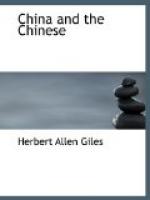“A certain person having forwarded some elixir of immortality to the Prince of Ching, it was received as usual by the doorkeeper. ’Is this to be swallowed?’ enquired the Chief Warden of the palace. ‘It is,’ replied the doorkeeper. Thereupon, the Chief Warden purloined and swallowed it. At this, the Prince was exceedingly angry and ordered his immediate execution; but the Chief Warden sent a friend to plead for him, saying, ’Your Highness’s servant asked the doorkeeper if the drug was to be swallowed, and as he replied in the affirmative, your servant accordingly swallowed it. The blame rests entirely with the doorkeeper. Besides, if the elixir of life is presented to your Highness, and because your servant swallows it, your Highness slays him, that elixir is clearly the elixir of death; and for your Highness thus to put to death an innocent official is simply for your Highness to be made the sport of men.’ The Prince spared his life.”
The later Taoist was not content with attempts to compound an elixir. He invented a whole series of physical exercises, consisting mostly of positions, or postures, in which it was necessary to sit or stand, sometimes for an hour or so at a time, in the hope of prolonging life. Such absurdities as swallowing the saliva three times in every two hours were also held to be conducive to long life.
There is perhaps more to be said for a system of deep breathing, especially of morning air, which was added on the strength of the following passage in Chuang Tzu:—
“The pure men of old slept without dreams, and waked without anxiety. They ate without discrimination, breathing deep breaths. For pure men draw breath from their uttermost depths; the vulgar only from their throats.”
A Chinese official with whom I became acquainted in the island of Formosa was outwardly a Confucianist, but inwardly a Taoist of the deepest dye. He used to practise the above exercises and deep breathing in his spare moments, and strongly urged me to try them. Apparently they were no safeguard against malarial fever, of which he died about a year or so afterward.
Associated closely with the elixir of immortality is the practice of alchemy, which beyond all doubt was an importation from Greece by way of Bactria.
We read in the Historical Record, under date 133 B.C., of a man who appeared at court and persuaded the Emperor that gold could be made out of cinnabar or red sulphide of mercury; and that if dishes made of the gold thus produced were used for food, the result would be prolongation of life, even to immortality. He pretended to be immortal himself; and when he died, as he did within the year, the infatuated Emperor believed, in the words of the historian, “that he was only transfigured and not really dead,” and accordingly gave orders to continue the experiments.
For many centuries the attempt to turn base metal into gold occupied a leading place in the researches of Chinese philosophers. Volumes have been written on the subject, and are still studied by a few.




